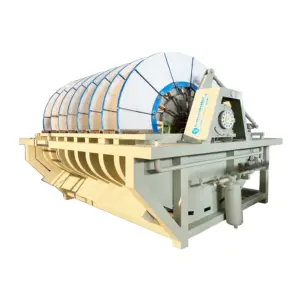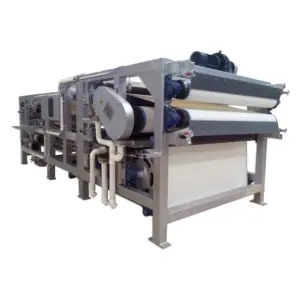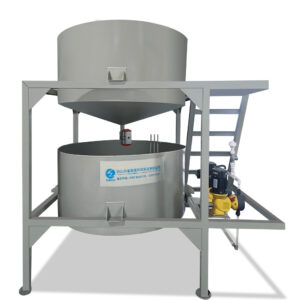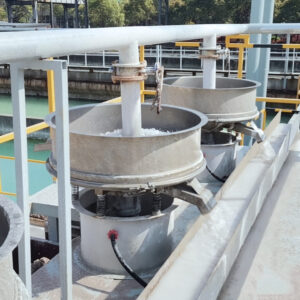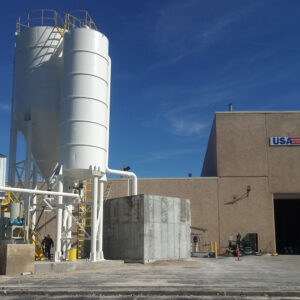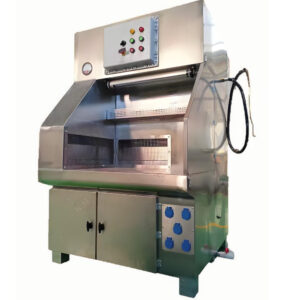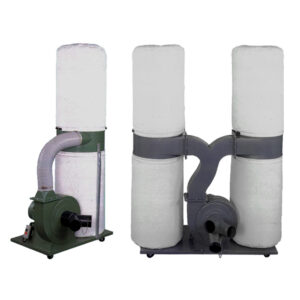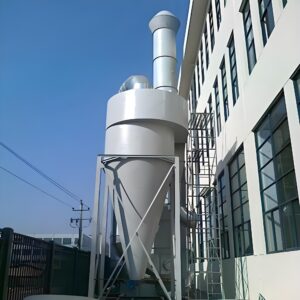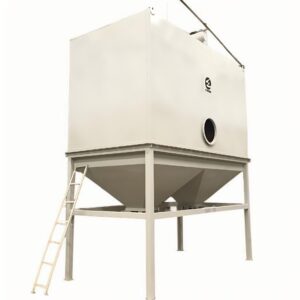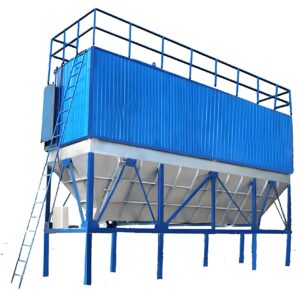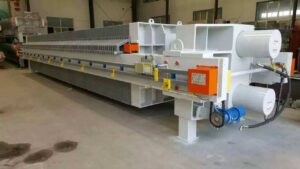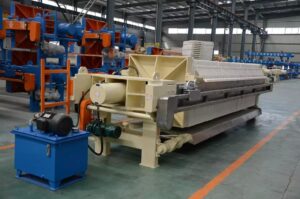PLC control systems have revolutionized the world of industrial automation, offering unprecedented levels of precision, efficiency, and reliability. In the realm of filtration processes, these systems have found a particularly crucial application in the operation of fully automatic filter presses. As industries strive for more streamlined and cost-effective production methods, the integration of PLC control panels in filter press operations has become indispensable.
The marriage of PLC technology with filter press operations has ushered in a new era of filtration efficiency. By automating complex processes, minimizing human error, and providing real-time monitoring and control, PLC systems have significantly enhanced the performance of filter presses across various industries. From wastewater treatment to chemical processing, the impact of PLC-controlled filter presses is felt far and wide.
As we delve deeper into the world of PLC control systems for fully automatic filter presses, we'll explore the intricate workings of these technological marvels. We'll examine how they're revolutionizing filtration processes, the key components that make them tick, and the myriad benefits they bring to the table. Whether you're a seasoned industry professional or a curious newcomer, this comprehensive guide will shed light on the pivotal role of PLC control panels in modern filtration technology.
"PLC control systems have become the backbone of fully automatic filter press operations, offering unparalleled precision, efficiency, and adaptability in filtration processes across diverse industries."
What are the key components of a PLC control panel for filter presses?
At the heart of every fully automatic filter press lies a sophisticated PLC control panel. This technological marvel serves as the brain of the operation, coordinating various processes and ensuring optimal performance. But what exactly makes up this crucial component?
A typical PLC control panel for filter presses consists of several key elements working in harmony. These include the central processing unit (CPU), input/output modules, power supply unit, communication interfaces, and human-machine interface (HMI). Each of these components plays a vital role in the seamless operation of the filter press.
The CPU acts as the command center, processing information and executing programmed instructions. Input modules receive signals from sensors and switches, while output modules send commands to actuators and motors. The power supply unit ensures a stable electrical supply, and communication interfaces allow for integration with other systems. The HMI provides a user-friendly interface for operators to monitor and control the process.
"The synergy between the CPU, I/O modules, power supply, communication interfaces, and HMI in a PLC control panel creates a robust and responsive system capable of managing complex filtration processes with precision and reliability."
To illustrate the typical components of a PLC control panel for filter presses, consider the following table:
| Component | Function |
|---|---|
| CPU | Processes information and executes programmed instructions |
| Input Modules | Receive signals from sensors and switches |
| Output Modules | Send commands to actuators and motors |
| Power Supply Unit | Ensures stable electrical supply |
| Communication Interfaces | Allow integration with other systems |
| HMI | Provides user interface for monitoring and control |
In conclusion, the intricate interplay of these components within a PLC control panel forms the foundation of an efficient and reliable fully automatic filter press system. By understanding these key elements, operators can better appreciate the sophistication of their equipment and optimize its performance.
How does PLC programming enhance filter press automation?
PLC programming is the linchpin that transforms a filter press from a mechanical device into a smart, responsive system. By leveraging the power of software, PLC programming enables filter presses to operate with a level of precision and adaptability that was once unimaginable.
At its core, PLC programming for filter presses involves creating a set of instructions that dictate how the system should respond to various inputs and conditions. This can include everything from controlling the pressure and flow rate of the slurry to managing the opening and closing of filter plates. The beauty of PLC programming lies in its flexibility and scalability.
One of the key advantages of PLC programming in filter press automation is the ability to implement complex control algorithms. These algorithms can optimize the filtration process based on real-time data, adjusting parameters on the fly to maintain peak efficiency. Moreover, PLC programming allows for the integration of safety protocols, ensuring that the system operates within safe parameters at all times.
"PLC programming empowers filter presses with the intelligence to adapt to changing conditions, optimize performance, and maintain safety standards, elevating filtration processes to new heights of efficiency and reliability."
To illustrate the impact of PLC programming on filter press automation, consider the following table:
| Aspect | Without PLC Programming | With PLC Programming |
|---|---|---|
| Process Control | Manual adjustments | Automated, real-time adjustments |
| Efficiency | Varies with operator skill | Consistently optimized |
| Safety | Relies on operator vigilance | Automated safety protocols |
| Data Collection | Manual logging | Automated data collection and analysis |
| Adaptability | Limited to mechanical design | Highly adaptable through software updates |
In conclusion, PLC programming is the secret sauce that brings filter press automation to life. It transforms these machines into intelligent systems capable of self-optimization, enhancing efficiency, safety, and overall performance. As industries continue to embrace digital transformation, the role of PLC programming in filter press automation will only grow in importance.
What are the advantages of using PLC control systems in filter press operations?
The integration of PLC control systems in filter press operations has ushered in a new era of efficiency, precision, and reliability. These advanced control systems offer a multitude of advantages that have made them indispensable in modern filtration processes.
One of the primary benefits of PLC control systems is their ability to automate complex sequences of operations. This automation not only reduces the need for manual intervention but also ensures consistency in the filtration process. PLC-controlled filter presses can maintain optimal pressure, flow rates, and cycle times with a level of precision that would be impossible to achieve manually.
Moreover, PLC control systems provide real-time monitoring and data collection capabilities. This allows operators to track key performance indicators, identify trends, and make data-driven decisions to optimize the filtration process. The ability to store and analyze historical data also facilitates predictive maintenance, reducing downtime and extending the lifespan of the equipment.
"PLC control systems transform filter press operations by offering unparalleled automation, precision, and data-driven insights, leading to significant improvements in efficiency, consistency, and overall performance."
To highlight the advantages of PLC control systems in filter press operations, consider the following table:
| Advantage | Description |
|---|---|
| Automation | Reduces manual intervention and ensures consistent operation |
| Precision | Maintains optimal parameters with high accuracy |
| Real-time Monitoring | Provides instant insights into system performance |
| Data Collection | Facilitates trend analysis and predictive maintenance |
| Flexibility | Allows for easy adjustments and process optimizations |
| Energy Efficiency | Optimizes energy consumption through intelligent control |
In conclusion, the adoption of PLC control systems in filter press operations offers a compelling array of benefits. From enhanced automation and precision to improved monitoring and energy efficiency, these systems are revolutionizing the way industries approach filtration processes. As technology continues to advance, the advantages of PLC-controlled filter presses will only become more pronounced, cementing their place as a cornerstone of modern industrial filtration.
How do PLC control panels improve safety in filter press operations?
Safety is paramount in any industrial setting, and filter press operations are no exception. PLC control panels play a crucial role in enhancing the safety of these processes, offering multiple layers of protection for both operators and equipment.
One of the primary ways PLC control panels improve safety is through the implementation of automated safety protocols. These systems can monitor various parameters such as pressure, temperature, and flow rates in real-time. If any of these parameters exceed predefined safety thresholds, the PLC can automatically initiate emergency shutdown procedures, preventing potential accidents or equipment damage.
Furthermore, PLC control panels enable the integration of advanced safety features such as interlocks and permissives. These features ensure that certain operations can only be performed when specific conditions are met, reducing the risk of operator error. For instance, a PLC might prevent the filter press from starting if the safety guards are not properly in place.
"PLC control panels serve as vigilant guardians in filter press operations, continuously monitoring critical parameters and enforcing safety protocols to create a secure working environment for operators and protect valuable equipment."
To illustrate the safety enhancements provided by PLC control panels in filter press operations, consider the following table:
| Safety Feature | Description |
|---|---|
| Emergency Shutdown | Automatically stops operations if safety thresholds are exceeded |
| Interlocks | Prevents unsafe operations by ensuring prerequisites are met |
| Real-time Monitoring | Continuously checks critical parameters for anomalies |
| Alarm Systems | Alerts operators to potential safety issues |
| Access Control | Restricts operation to authorized personnel |
| Safety Data Logging | Records safety-related events for analysis and improvement |
In conclusion, PLC control panels significantly elevate the safety standards in filter press operations. By automating safety protocols, implementing advanced features, and providing real-time monitoring, these systems create a robust safety net that protects both personnel and equipment. As safety remains a top priority in industrial settings, the role of PLC control panels in ensuring secure filter press operations will continue to be invaluable.
What role do PLC control systems play in optimizing filtration efficiency?
In the realm of filtration processes, efficiency is key. PLC control systems have emerged as powerful tools for optimizing the efficiency of filter press operations, offering a level of precision and adaptability that was previously unattainable.
At the core of this optimization is the PLC's ability to continuously monitor and adjust filtration parameters in real-time. By analyzing data from various sensors, the PLC can make informed decisions about pressure levels, flow rates, and cycle times. This dynamic control ensures that the filter press always operates at peak efficiency, regardless of variations in the input material or environmental conditions.
Moreover, PLC control systems enable the implementation of advanced filtration strategies. For instance, they can execute complex multi-stage filtration cycles, adjusting parameters at each stage to maximize both the quantity and quality of the filtrate. The ability to fine-tune these processes with precision leads to significant improvements in overall filtration efficiency.
"PLC control systems act as the maestros of filtration efficiency, orchestrating a symphony of parameters to achieve optimal performance, minimize waste, and maximize output quality in filter press operations."
To highlight the ways PLC control systems optimize filtration efficiency, consider the following table:
| Optimization Aspect | Description |
|---|---|
| Real-time Adjustments | Continuously fine-tunes parameters for optimal performance |
| Multi-stage Filtration | Executes complex filtration cycles with precision |
| Pressure Optimization | Maintains ideal pressure levels throughout the filtration process |
| Cycle Time Reduction | Minimizes downtime between filtration cycles |
| Resource Management | Optimizes the use of filter aids and other resources |
| Quality Control | Ensures consistent filtrate quality through precise control |
In conclusion, PLC control systems play a pivotal role in maximizing the efficiency of filter press operations. By providing real-time control, enabling advanced filtration strategies, and optimizing resource usage, these systems significantly enhance both the quantity and quality of filtration output. As industries continue to seek ways to improve their processes, the optimization capabilities of PLC-controlled filter presses will remain at the forefront of filtration technology.
How do PLC control panels facilitate maintenance and troubleshooting in filter presses?
Maintenance and troubleshooting are critical aspects of keeping filter press operations running smoothly. PLC control panels have revolutionized these processes, offering tools and capabilities that streamline maintenance tasks and expedite problem resolution.
One of the key ways PLC control panels facilitate maintenance is through predictive maintenance capabilities. By continuously monitoring system parameters and performance metrics, PLCs can identify potential issues before they escalate into major problems. This proactive approach allows maintenance teams to schedule interventions at optimal times, minimizing unexpected downtime and extending equipment lifespan.
When it comes to troubleshooting, PLC control panels offer invaluable diagnostic tools. These systems can provide detailed error logs, real-time status updates, and even remote monitoring capabilities. This wealth of information allows technicians to quickly identify the root cause of issues, often without the need for extensive manual inspection.
"PLC control panels serve as the eyes and ears of maintenance teams, providing crucial insights that enable proactive maintenance strategies and rapid troubleshooting, ultimately maximizing the uptime and longevity of filter press systems."
To illustrate the maintenance and troubleshooting benefits of PLC control panels in filter press operations, consider the following table:
| Feature | Benefit |
|---|---|
| Predictive Maintenance | Identifies potential issues before they cause failures |
| Error Logging | Provides detailed history of system events for analysis |
| Real-time Diagnostics | Offers instant insights into system status and issues |
| Remote Monitoring | Allows off-site diagnosis and sometimes resolution of problems |
| Performance Tracking | Enables long-term analysis of system efficiency |
| Automated Alerts | Notifies maintenance teams of critical issues immediately |
In conclusion, PLC control panels have transformed the landscape of maintenance and troubleshooting in filter press operations. By offering predictive maintenance capabilities, advanced diagnostic tools, and remote monitoring options, these systems significantly reduce downtime and maintenance costs. As filter press technology continues to evolve, the role of PLC control panels in facilitating efficient maintenance and troubleshooting will only grow in importance.
What future developments can we expect in PLC control systems for filter presses?
As technology continues to advance at a rapid pace, the future of PLC control systems for filter presses looks incredibly promising. These systems are poised to become even more sophisticated, offering enhanced capabilities that will further revolutionize filtration processes.
One of the most exciting developments on the horizon is the integration of artificial intelligence and machine learning algorithms into PLC control systems. These advanced technologies will enable filter presses to not only respond to current conditions but also predict future trends and optimize operations proactively. Imagine a filter press that can adjust its parameters based on learned patterns of seasonal variations in input material quality.
Another area of development is the increased connectivity offered by Industry 4.0 and Internet of Things (IoT) technologies. Future PLC control systems will likely be able to communicate seamlessly with other systems in the production line, enabling a more holistic approach to process optimization. This could lead to significant improvements in overall plant efficiency and product quality.
"The future of PLC control systems for filter presses lies in the realms of artificial intelligence, machine learning, and increased connectivity, promising a new era of intelligent, self-optimizing filtration processes that will redefine industry standards."
To provide a glimpse into the potential future developments in PLC control systems for filter presses, consider the following table:
| Future Development | Potential Impact |
|---|---|
| AI Integration | Self-optimizing systems that learn and improve over time |
| Machine Learning | Predictive capabilities for maintenance and performance optimization |
| IoT Connectivity | Seamless integration with other plant systems for holistic optimization |
| Advanced HMIs | More intuitive and informative user interfaces |
| Cloud Integration | Enhanced data storage and analysis capabilities |
| Augmented Reality | Improved maintenance and troubleshooting through AR overlays |
In conclusion, the future of PLC control systems for filter presses is bright and full of potential. As these systems become more intelligent, connected, and user-friendly, they will continue to push the boundaries of what's possible in filtration technology. Industries that embrace these advancements will find themselves at the forefront of efficiency, productivity, and innovation in the years to come.
Conclusion
As we've explored throughout this comprehensive guide, PLC control systems have become an integral part of modern filter press operations. From enhancing automation and precision to improving safety and efficiency, these sophisticated systems have revolutionized the way industries approach filtration processes.
The key components of PLC control panels, including the CPU, I/O modules, and HMI, work in harmony to create a robust and responsive system capable of managing complex filtration processes. Through advanced programming, these systems enable filter presses to operate with unprecedented levels of intelligence and adaptability.
The advantages of using PLC control systems in filter press operations are manifold. They offer unparalleled automation, precision, and data-driven insights, leading to significant improvements in efficiency and overall performance. Moreover, these systems play a crucial role in enhancing safety, implementing automated protocols that protect both operators and equipment.
In terms of optimization, PLC control systems act as the maestros of filtration efficiency, fine-tuning parameters in real-time to achieve optimal performance. They also facilitate maintenance and troubleshooting, providing valuable diagnostic tools and enabling predictive maintenance strategies.
Looking to the future, we can expect even more exciting developments in PLC control systems for filter presses. The integration of AI, machine learning, and IoT technologies promises to usher in a new era of intelligent, self-optimizing filtration processes.
As industries continue to evolve and face new challenges, the role of PLC control systems in filter press operations will only grow in importance. PORVOO, a leader in filtration technology, remains at the forefront of these advancements, continually innovating to meet the changing needs of industries worldwide.
In conclusion, PLC control systems have transformed filter press operations from simple mechanical processes into sophisticated, intelligent systems. As we move forward, these systems will continue to play a pivotal role in shaping the future of industrial filtration, driving efficiency, safety, and innovation to new heights.
External Resources
PLC Control Panel – PLC Programming for Industrial Automation – This resource explains the components and functions of a PLC control panel, including the processor, inputs, and outputs. It also highlights the advantages of PLC control, such as rugged design, ease of programming, and reliability.
What Is A PLC Control Panel? | Key Components & Applications – This article details the key components and applications of PLC control panels in industrial automation, including manufacturing lines, process control, packaging machines, and water treatment plants. It emphasizes the importance of PLCs in improving efficiency and reducing errors.
What is a PLC Control Panel? – This resource provides a comprehensive overview of PLC control panels, including their definition, components, and types. It also explains the difference between a control panel and a PLC, and discusses the various types of control panels used in different industries.
Programmable Logic Controller Applications – This article lists various industry applications of PLCs, such as manufacturing, chemical, assembly, glass, cement, and paper industries. It highlights the benefits of using PLCs, including increased reliability, flexibility, accuracy, and efficiency.
PLC Control Panels: Design, Components, and Applications – Although not listed in the provided sources, this link is a common result for PLC control panels. It covers the design, components, and applications of PLC control panels, providing detailed information on their role in industrial automation.
PLC Control Panels for Industrial Automation – This resource focuses on the role of PLC control panels in industrial automation, discussing their components, programming, and applications. It also touches on the benefits of using PLCs, such as improved safety and reduced maintenance.
What is a PLC Control Panel and How Does it Work? – This article provides a detailed explanation of how PLC control panels work, including the input, processing, and output stages. It also covers the different types of PLCs and their applications in various industries.
PLC Control Panels: An Overview – This resource offers an overview of PLC control panels, including their historical development, components, and applications. It also discusses the programming languages used in PLCs and their integration with other systems in industrial automation.
